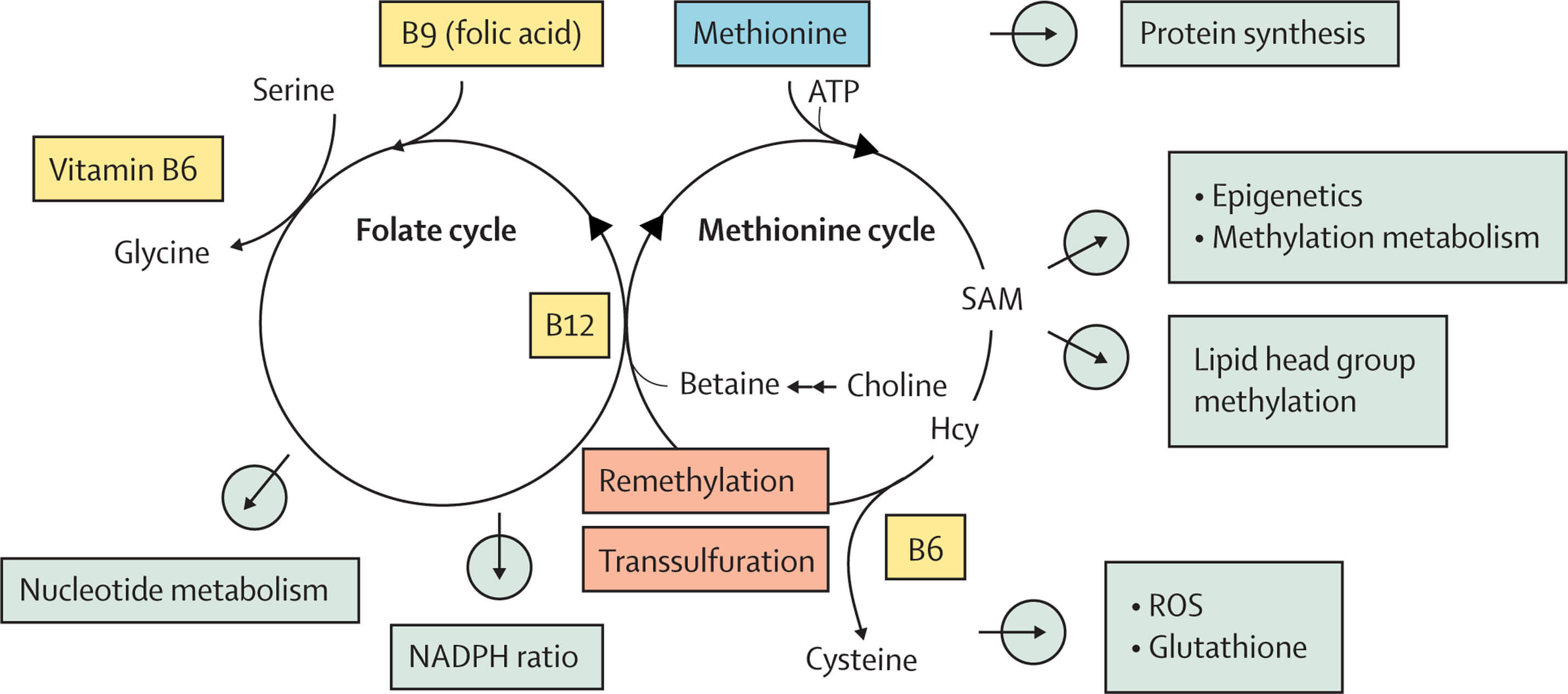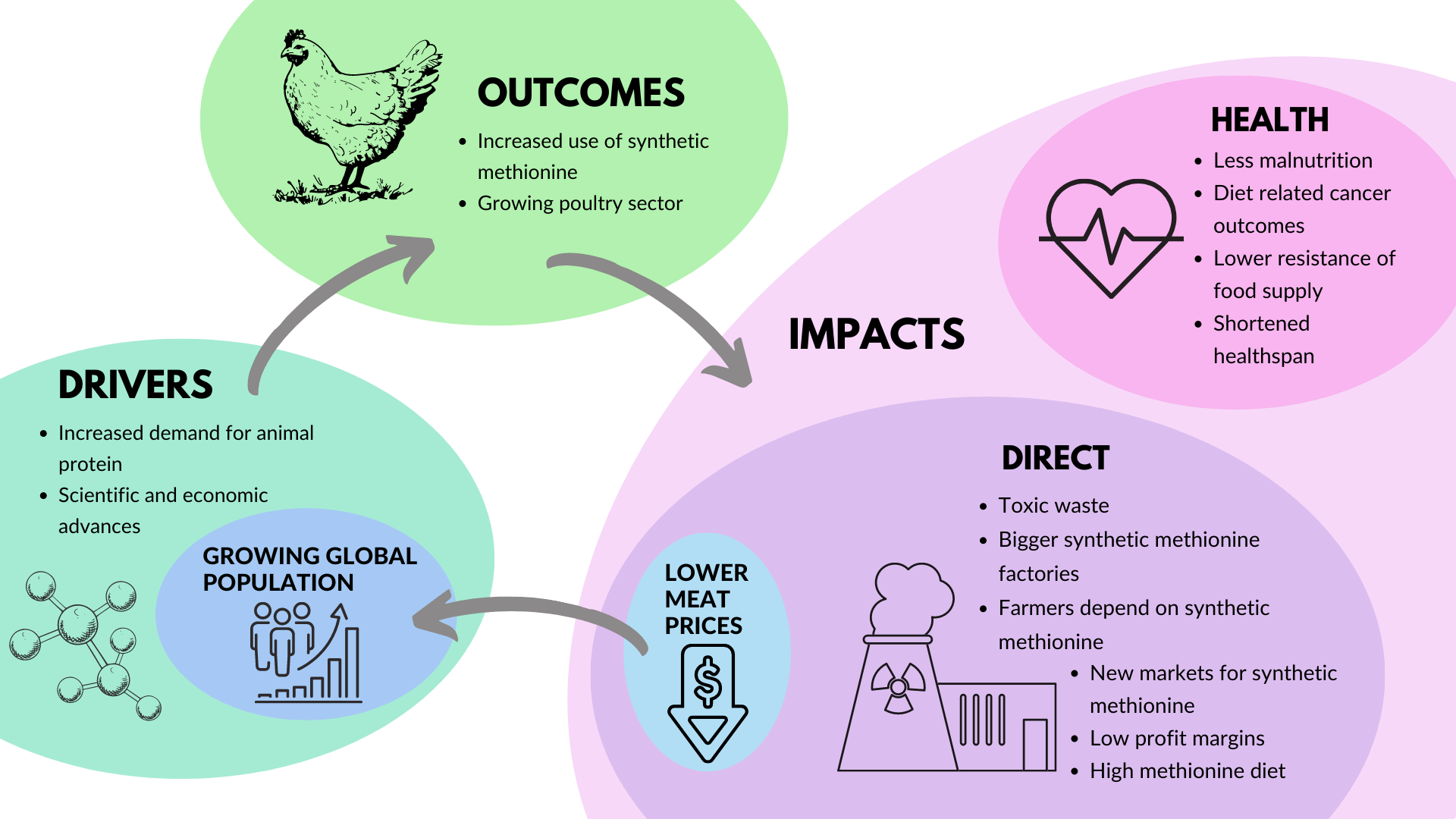Methionine: A double-edged sword
Vegan Society of Canada News
April 18th 2022
We have discussed many times in the past the health benefits of a vegan lifestyle. Unfortunately, as we discussed in our article about superbugs, our current economic system fails when it comes to producing cures that are not profitable, such as antibiotics. This also applies to the health benefits of a vegan lifestyle, which unlike traditional medicine is hard to monetize for businesses. Lifestyle changes and various other initiatives under the umbrella of preventive medicine are not very popular, even in Canada with taxpayer-funded health care where the incentive to prevent diseases instead of curing them should be paramount.
Nevertheless, there is research that looks into less profitable solutions. Today, we will be discussing the double-edged sword of methionine. Plant sources of protein are quite low in methionine compared to animal sources, and that is often highlighted as a drawback of veganism. However, recent research in the role of methionine shows that, while it is essential, it seems clear that more can be dangerous. Methionine plays an important role in human animals and animal agriculture. Below is a diagram outlining how the one-carbon metabolism with methionine works in many animals.

Methionine is an essential amino acid that is necessary for animals to function properly and must be derived from food. It is the initiating amino acid for protein synthesis and is the key component for one-carbon metabolism. It is responsible for many functions, including folate metabolism, autophagy, protein synthesis, and DNA methylations.
Because plants have much lower levels of methionine, about half as much as animal products, people who consume plants only have lower levels of methionine in their systems. However, research has discovered that while methionine is necessary to sustain life, it’s also crucial to cancer development. It was discovered that many cancer cells are dependent on exogenous sources of methionine, despite being able to synthesize it from its precursor homocysteine. When cultivated without this exogenous source of methionine, many types of cancer cells eventually die.
The reasons behind the strong dependence of cancer cells on exogenous sources of methionine are not well understood. Nevertheless, a recent literature review found good results by using a methionine-restricted diet, not only on killing cells from some of the most common cancers like those of the prostate and breasts but also increasing the efficacy of widely used cancer drugs. There is a current hypothesis that a longer lifespan attributed to a calorie-restricted diet is in fact due to methionine restriction and not reduced calories themselves.
Existing research already has demonstrated that restricting the intake of other amino acids does not have similar effects as the restriction of methionine, but more research is needed to elucidate whether the life-extension effects are related to methionine restriction. The typical North American diet does not only contain more calories than it should, but also more of those calories come from animal sources which are higher in methionine.
While the impact of methionine restriction on life extension and cancer treatment appears clearer, the impact on cancer risk is much less so. Various studies seem to indicate that a low methionine intake has little to no impact on cancer risks. However, this is another example where studying people who self-identify as vegans might be beneficial. As we have seen in the case of dairy and breast cancer, sometimes the negative effects of substances like dairy start at such a low level that the lowest control group is still above this level, hiding the true effect of the substance being studied.
A study on people who self-identify as vegans could give us better insights since, presumably, this group would have some of the lowest methionine consumption of any group. However, the result may not be useful since we already know that people following a vegan lifestyle have lower incidences of cancer, so we would expect to see the same outcome with a vegan control group.
It may be that determining if the exact benefits of a vegan lifestyle are due to its low methionine intake will only be accomplished when drugs that artificially lower methionine in the average human become available. In this way, we could compare various groups of people while only varying their methionine levels. But it may be many years before we get a clear answer to this question.
Even the mechanism by which low methionine intake may affect aging and cancer is not well understood. Since methionine is at the centre of the one-carbon metabolism and is directly or indirectly involved in many roles, it is likely that there is not a single reason. One hypothesis to help explain this is that the extra DNA methylation that cancer cells usually have requires a lot more methionine to process than normal cells.
As we have said, advising people to simply consume less methionine is not a profitable commercial endeavour. Therefore, most research so far has been on creating drugs to artificially lower methionine levels in the system or a special concoction of all essential amino acids minus methionine. Nevertheless, some researchers are starting to ask the question.
Methionine is present in small quantities in most foods but in higher concentrations in foods of animal origins. It is thought that for human animals a minimum of 10.4mg/kg of body weight is necessary for long-term health. This is to offset various natural losses of nitrogen in urine, feces, hair, sweat, etc. However, more recent research suggests that methionine requirements vary greatly as we age, going down drastically after early adulthood and could be as low as 6mg/kg per day.
There are still many things we do not understand about the relationship between methionine, cancer, intake levels and its impact on health. Furthermore, to complicate the picture even more, in the last half century animal agriculture has ramped up its use of synthetic methionine derived from fossil fuels whose effects are even more unclear on human animals.
It should be no surprise the use of synthetic methionine in animal agriculture is related to increased profits. As corporations went to cheaper sources of feed, like genetically modified corn and soy, and with the need to make animals grow bigger and faster came the need to supplement their diets with synthetic methionine.
It is clear that since the effects of methionine itself on animal health and cancer are unclear, the impact of synthetic methionine on health is even further away from being fully understood. Regrettably, if history is any indication, it is likely to take many more decades before we fully understand what is going on. In a system where profit tends to overcome any other concerns—like safety or health as we have witnessed in the case of lead, asbestos and tobacco—it is likely many human animals will die before we finally understand what is happening. All the while, subsidies by the billions will continue to encourage diets high in both synthetic and naturally occurring methionine with questionable outcomes.
In the Lancet’s report on the planetary health perspective of synthetic methionine, they do an excellent job of laying out all the complex variables:

The article discusses all the potential issues with synthetic methionine and how all those factors are interrelated. Their calculations estimate that on average a human animal in a country with a typical North American diet would have about 10% of their methionine intake be in synthetic form.
Once again, animal agriculture is potentially causing more havoc. Not only is this industry directly or indirectly responsible for many problems, like our superbug epidemic, but they continuously find novel ways to kill and exploit animals in their quest for increased profits. It may well turn out that synthetic methionine is no more harmful in high quantities than the regular methionine obtained naturally from foods, but that won’t change the concern around high methionine intake.
As we know, businesses that profit from dairy advertise their products as a superior source of calcium while forgetting to mention the reasons behind the calcium paradox. Similarly, the businesses that profit from animal protein advertise their products as a superior source of protein, while conveniently forgetting to mention that the scientific consensus in the last 20 years has shifted toward the view that animal proteins with high methionine content lead to adverse health effects.
If this were the only issue with animal agriculture, and if life extension and reduced cancer incidences were the only benefits of a vegan lifestyle, one may be able to overlook all of this. But that is not the case.
A change of lifestyle offers individuals a powerful means to combat a range of issues, including personal health problems, climate change, loss of biodiversity, global acidification, eutrophication, freshwater shortages, pandemic prevention, antibiotic resistance, save countless lives and much more. We know of no other efficient way for individuals to address these critical challenges simultaneously without waiting for government, corporate, or technological interventions. By changing lifestyle, people can take immediate and impactful action. We encourage you to embrace this lifestyle change today. Contact us for support and to connect with local communities in your area.




